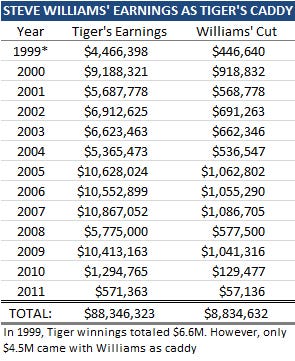Alright, let me tell you about my deep dive into the world of “Tiger Woods caddie salary.” It was a rabbit hole, but a fascinating one.

First off, I started with the basics: just a plain old Google search. Typed in “Tiger Woods caddie salary” and braced myself for the results. I saw a bunch of articles estimating his caddie’s earnings, Joe LaCava, but I wanted to know more, like how they figured that out.
Then, I hit up the golf forums. These are goldmines, seriously. Real people, often with some insider knowledge, just chatting about the game. I searched the forums for threads about caddie pay, specifically mentioning Tiger. Scrolled through pages of discussions, some helpful, some just random opinions, but hey, that’s the internet.
Next up: news archives. I figured if Tiger had a particularly good year, or if there was ever any drama with his caddie’s contract, it might be in the news. Used some advanced search operators like “Tiger Woods caddie salary contract” to narrow things down. Dug through articles from ESPN, Golf Digest, and a few smaller golf publications.
Here’s where it got interesting: I started piecing together a general formula. Most articles mentioned that caddies typically get a percentage of the golfer’s winnings – usually 10% for a win, 7% for a top 10 finish, and 5% for making the cut. So, I grabbed Tiger’s tournament results for the past few years (easily found on the PGA Tour website) and did some math.
- I calculated his total winnings.
- Then, I applied the percentage breakdown. Let’s say he won $5 million, had 5 top 10s, and made the cut in a bunch of other tournaments.
- I added it all up. This gave me a rough estimate of what his caddie could have earned.
But here’s the kicker: that’s just based on winnings. Many top golfers also pay their caddies a base salary or weekly rate, plus cover their travel expenses. This is where things get murky because those numbers are rarely public. I had to rely on educated guesses from forum discussions and the occasional quote from a caddie in an interview. Some folks suggested a base salary of $100k or more, but that’s just speculation, really.
So, what did I learn? Estimating a top golfer’s caddie salary is part art, part science. You can get a decent idea based on tournament winnings, but the full picture is much more complex and involves private agreements.
My final conclusion: Joe LaCava likely made a very, very comfortable living, but nailing down the exact number is almost impossible without access to Tiger’s financial records. Still, it was a fun dive into the business side of professional golf.


















